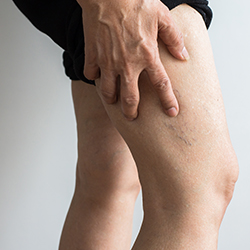Learning More About Veins
Published on May 3, 2019 by Raffi Dishakjian
Veins are elastic blood vessels that carry blood from different parts of the body to the heart. Most veins carry deoxygenated blood to the heart, the only exceptions being pulmonary and umbilical veins that carry oxygenated blood to the heart.
Veins are a part of the cardiovascular system that pumps blood and supplies nutrients to different parts of the body. The venous system depends on muscle contractions to perform its role. Almost every vein has a valve that prevents the blood from flowing in the opposite direction (backflow).
Different Types of Veins
Superficial Veins
Superficial veins are located very close to the surface of the body. Unlike deep veins, that are accompanied by an artery by the same name, superficial veins are not paired with an artery. When the body temperature increases, the body pushes the blood in the deep veins to the superficial veins for cooling.
Superficial veins carry less blood than deep veins and are not as important. These veins are sometimes removed in vein stripping, a procedure performed to treat varicose veins.
Deep Veins
Unlike superficial veins that are close to the surface of the body, deep veins, as the name suggests are located deep in the body. Deep veins are responsible for transporting 90-95 percent of the venous blood to the heart. Almost all deep veins have an artery by the same name running beside them.
Blockage in a deep vein can be life threatening, because they are located deep in the body. Operating on these types of veins can be tricky and requires the skilled hands of an experienced surgeon.
Systemic Veins
The systemic venous system consists of veins that originate from a set of capillaries and drains into the right atrium. The systemic venous system consists of two large veins:
Superior Vena Cava
Located in the anterior right superior mediastinum, the superior vena cava has the responsibility of returning the deoxygenated blood to the upper chamber of the heart. Different types of cancer result in the blockage of the superior vena cava. When this happens, veins in the head and neck enlarge causing breathlessness, severe coughs, and chest pain.
Inferior Vena Cava
The inferior vena cava transfers impure blood from the lower and middle part of the body to the right atrium of the heart. The inferior vena cava has valves that prevent the blood from back flowing.
Colorectal cancer, ovarian cancer, renal cell cancer, and other abdominal malignancies can create external pressure that often suppresses the inferior vena cava . Though rare, blockages can be life threatening and must be taken care of immediately.
Communicating Veins
Communicating veins facilitate communicate between different points in the venous system.
Pulmonary Veins
Pulmonary veins transport purified blood from the lungs to the heart. The main veins emerge from the lung hilum and drain into the upper chamber.
Common Vein Problems
People with a blockage (mostly caused due to blood clots) or those with a hereditary defect experience different vein issues, such as superficial thrombophlebitis, a condition resulting from the blockage of superficial veins.
Similarly, deep vein thrombophlebitis is caused due to the blockage of the deep veins. A common cause of vein problems is varicose veins that develop in the tissue located under the skin.
Contact Our Office
In order to treat issues that affect the veins, you’ll need the help of a skilled vein expert. Contact Nu Vela Laser and Vein Center to schedule an appointment with skilled vein specialist Dr. Raffi Dishakjian today!


